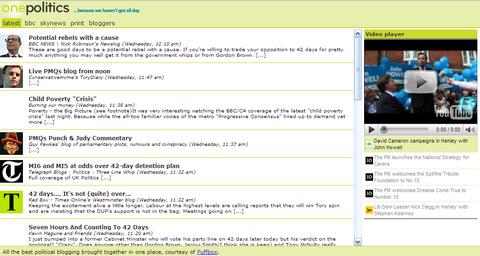Relaunched* (presumably?) at the weekend’s Spring Conference, LabourSpace.com is the Labour Party’s campaign-based social network. Ed Miliband’s welcome message calls it ‘the place where those of us who share Labour’s values come to discuss how we want to make Britain a better place to live.’ There’s much to like about it, but they get some things stunningly wrong.
As the name suggests, MySpace is the role model. You’ve got pictorial lists of friends campaign supporters, and a campaign blog (with comments, but without RSS). There’s a simple one-click process to support or oppose the campaign in question, as well as a curious ‘revoke’ option (?). But it’s the addition of the pro-active viral aspects which make it interesting. The campaign’s ‘top recruiter’ gets their picture on the campaign profile, and there’s a competitive element to the site, based on the number of supporters recruited each monthly (?) ’round’. There’s a big button to ’email a newspaper about this campaign’. And there’s an ’email a friend’ option too.
But, er, hang on. The ’email a friend’ option wants me to supply the username and password for my personal email account? Are they serious? I imagine they want to scour my address book for people I might want to spam about my campaign… but come on guys, did you miss the recent news stories about data security?
That’s far from the only downside. There’s very little explanation of how the site actually works, apart from a Flash movie on the homepage (which nobody will sit through)… not even an ‘About’ page. The registration process is very intrusive, with address and postcode mandatory. You need to be a registered member to do almost anything, including comment on the blogs. They’ve given zero thought to SEO, judging by the lack of sensible page titles or URLs – and frankly, it looks a bit ugly.
Plus, I don’t believe ‘bringing your campaign to the attention of senior Labour politicians’ constitutes an adequate ‘prize’. If Labourspace is going to get any kind of traction, senior Labour politicians will have to take notice of it regardless. (See ConservativeHome, for example.) Offering attention as a prize doesn’t bode well.
This site could have been absolutely fantastic: e-petitions taken to the next level. But they’ve gone out of their way to make it difficult to engage with. With David Cameron talking today about making it easier and less onerous for people to connect with his party, this seems completely the wrong approach.
The Spring Conference date was known well in advance. So, what would I do with it?
- Lose the ‘hand over your email password’ thing immediately. Unforgiveable.
- Write a few pages telling me what the hell is going on. Dump the Flash intro.
- Lose the Labour brand. Make me want to engage with the site, its community, its campaigns. Then let me be pleasantly surprised that it’s a Labour-backed initiative.
- Don’t make everything ‘registered users only’. Encourage outsiders to participate.
- Improve the design, and give campaign owners some freedom to design their own space.
- If you’re going to do blogs, do them properly. RSS feeds would be a start.
- Consider adding a spellcheck. It doesn’t give me great confidence in Labour’s education efforts if site members can’t spell.
- Where’s the ability to take campaigns outside – to my own blog? my own Facebook profile?
- Think about SEO. Start with proper page titles.
- And clean up the source code: what’s with all the commented-out ‘lorem ipsum’ on the homepage?
Someone is eventually going to build the ultimate political campaigning platform. This could have been it. It isn’t.
*Update: sorry, just after I first posted this, I discovered it’s been around for a while. It looks like this is a relaunch rather than an initial launch, rebuilt on a new platform.
 I never ‘got’
I never ‘got’ 
